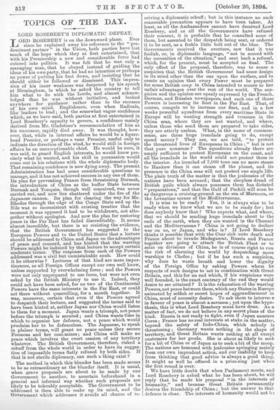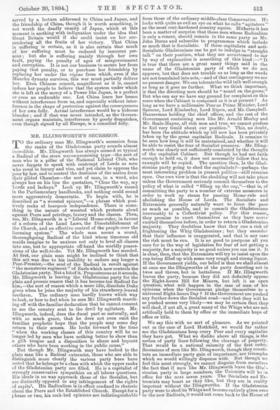TOPICS OF THE DAY.
LORD ROSEBERY'S DEPLOMATIC DEFEAT. LORD ROSEBERY is on the downward plane. Ever since he explained away his reference to the "pre- dominant partner" in the Union, both parties have lost much of the hope which they at first entertained, that with his Premiership a new and considerable force had entered into politics. It was felt that he was . only a managing man, that he obeyed instead of guiding the ideas of his own party, that he had no intention or perhaps no power of putting his foot down, and insisting that he should either be followed or dismissed. This impres- sion of his inner weakness was deepened by his speech at Birmingham, in which he asked the country to tell him what to do with the Lords, and almost acknow- ledged that he was without initiative, and looked anywhere for guidance rather than to the recesses of his own mind. Englishmen, even when Radicals, like leaders to lead ; and the somewhat vague confidence which, as we have said, both parties at first entertained in Lord Rosebery's capacity to govern, a confidence mainly derived from Mr. Gladstone's recommendation of him as his successor, rapidly died away. It was thought, how- ever, that, while in internal affairs he would be a figure- head Premier, or perhaps a vane Premier, useful only to indicate the direction of the wind, he would still in foreign affairs be an unexceptionable chief. He would be sure, it was said, to guard English interests, he would know pre- cisely what he wanted, and his skill in persuasion would come out in his relations with the whole diplomatic body. That remaining confidence is now dying away. The present Administration has had some considerable questions to manage, and it has not achieved success in any one of them. Its plan for preventing France from threatening Burinah, the introduction of China as the buffer State between 13urma,h and. Tonquin, though well conceived, was never carried out, and now lies shattered under the fire of the Japanese cannon. Its plan for clearing the way for Mr. Rhodes through the edge of the Congo State and up the Nile was so inconsistent with existing treaties that the moment it was opposed it had to be withdrawn, not alto- gether without apologies. And now the plan for restoring peace in the Far East has failed discreditably. It seems almost incredible, but there is no resisting the evidence, that the British Government has suggested to the European Powers and. to the United States that a lecture should be addressed to China and Japan on the advantages of peace and concord, and has hinted that the warring Powers might be induced by that lecture to accept certain moderate terms. The response from each of the Powers addressed was a civil but unmistakable snub. How could it be otherwise ? Lectures of that kind are mere imper- tinences, as all Foreign Offices except our own well know, unless supported by overwhelming force ; and the Powers were not only unprepared to use force, but were not even asked by the British Ministry to use it. Indeed, they could not have been asked, for no two of the Continental Powers have the same interests in the Far East, or could act there without quarrelling, for a, month together. It was, moreover, certain that even if the Powers agreed to despatch their lecture, and suggested the terms said to have been hinted at, neither Japan nor China would listen to them for a moment. Japan wants a triumph, not peace before the triumph is secured ; and China wants time in which to organise her defence, not a. peace which would proclaim her to be defenceless. The Japanese, to speak in plainer terms, will grant no peace unless they secure Formosa and her coal-mines; and China will make no peace which involves the overt cession of any territory whatever. The British Government, therefore, risked a rebuff from the whole world in order to have its sugges- tion of impossible terms flatly refused by both sides. If that is not sterile diplomacy, can such a thing exist ?
The method in which this blunder has been made seems to be as extraordinary as the blunder itself. It is usual, when grave proposals are about to be made by one Government to another, to ascertain beforehand in a general and informal way whether such proposals are likely to be tolerably acceptable. The Government to be addressed is then able to make up its mind, and the Government which addresses it avoids all chance of re- ceiving a diplomatic rebuff ; but in this instance no such reasonable precaution appears to have been taken. At least, as all the Ambassadors cannot have deceived Lord Rosebery, and as all the Governments have refused their consent, it is probable that he consulted none of them, but assented to the despatch being sent, or ordered it to be sent, as a feeble little bolt out of the blue. The Governments received the overture, saw that it was foolish, or, in diplomatic language, "not in accord with the necessities of the situation," and sent back a refusal, which, for the present, must be accepted as final. The only effect of the proposal, therefore, was to rouse a suspicion that the British Government had some design in its mind other than the one upon the surface, and to create an opinion that every Power must be prepared for some British coup in China intended to secure to her unfair advantages over the rest of the world. The sus- picion and the opinion are openly expressed by the French, German, and Russian newspapers, and each one of those Powers is increasing its fleet in the Far East. That, of course, compels us to increase our fleet, and in a few weeks powerful squadrons from every maritime State in Europe will be wasting strength and treasure in the China seas, where they are not wanted, and where, unless those who send them are prepared to take sides, they are utterly useless. What, in the name of common- sense, are these huge ironclads going to do, except spend money ? They are, we are told, "to protect the threatened lives of Europeans in China ; " but is not that pure nonsense ? The squadrons already there are amply sufficient to protect Europeans on the coast, and all the ironclads in the world could not protect them in the interior. An ironclad of 7,000 tons can no more steam to Hankow than it can steam off the planet, and its presence in the China seas will not protect one single life. The plain truth of the matter is that the jealousies of the nations have been aroused ; that the sleepless dread of British guile which always possesses them has dictated "preparations," and that the Gulf of Pechili will soon be as dangerous a cruising-ground as the sea of Marruora, or the Levantine corner of the Mediterranean.
It is wise to be ready ? Yes, it is always wise to be ready when we know what we are to be ready for ; but does anybody know that ? Who expects what, and where, that we should be sending huge ironclads about to the ends of the earth, when they are wanted in the Channel and the Mediterranean ? China is not going to declare war on us, or Japan, and who is ? If Lord Rosebery thinks it possible that with the Czar sick unto death and France about to invade Madagascar, Russia and France together are going to attack the British Fleet or to seize on divisions of China, he is of course right to run the risk of alarming the world by despatching more warships to Chefoo ; but if he has such a suspicion, why does he waste breath and lower the dignity of the Foreign Office by asking Powers whom he suspects of such designs to act in combination with Great Britain, and this for an end which, if his suspicions were well founded, is the exact contrary of the end they would desire to see attained ? It is the exhaustion of the warring Powers, not peace between them, which any States in Europe animated by selfish or secret hopes of aggrandisement in China, must of necessity desire. To ask them to interver e in favour of peace is almost a sarcasm ; yet upon the hypo- thesis, this is what Lord Rosebery must have done. As a matter of fact, we do not believe in any secret plans of the kind. Russia is not ready to fight, even A Japan annexes Corea ; France has no real interests at stake in the matter, beyond the safety of Indo-China, which nobody is threatening ; Germany wants nothing in the shape of territory, and Great Britain wants nothing at all except customers for her goods. She is about as likely to seek for a bit of China or of Japan as to seek a bit of the moop. The nations are bemused with jealousies springing mainly from our own imprudent action, and our inability to keep from thinking that good advice is always a good thing. It might as well be offered in a prize-ring just when the first round is over.
We have little doubt that when Parliament meets, and Lord Rosebery is asked what he has been about, he will reply that he made his proposal "in the interests of humanity," and because Great Britain permanently desires the friendship of China ; but the answer to that defence is clear. The interests of humanity would not ba served by a lecture addressed to China and Japan, and the friendship of China, though it is worth something, is not worth the deadly enmity of Japan, which at this moment is seething with indignation under the idea that Great Britain would if she could insist on her sur- rendering all the fruits of her victory. That China is suffering is certain, as it is also certain that much of her suffering must be endured by innocent per- sons ; but she is suffering mainly through her own fault, paying the penalty of ages of misgovernment and corruption. It is not our business to secure her from paying that penalty, or to purchase her friendship by replacing her under the rjginte from which, even if the Manchu dynasty survives, this war must partially deliver her. Even Chinese conceit, magnificent as it is, cannot induce her people to believe that the system under which she is left at the mercy of a Power like Japan, is a perfect or even an endurable one. Let China learn her lesson without interference from us, and especially without inter- ference in the shape of protection against the consequences of her own folly. Actual interference would be a hideous blunder ; and if that was never intended, as the Govern- ment organs maintain, interference by goody despatches, even though signed by all Europe, is a conceited folly.





































 Previous page
Previous page